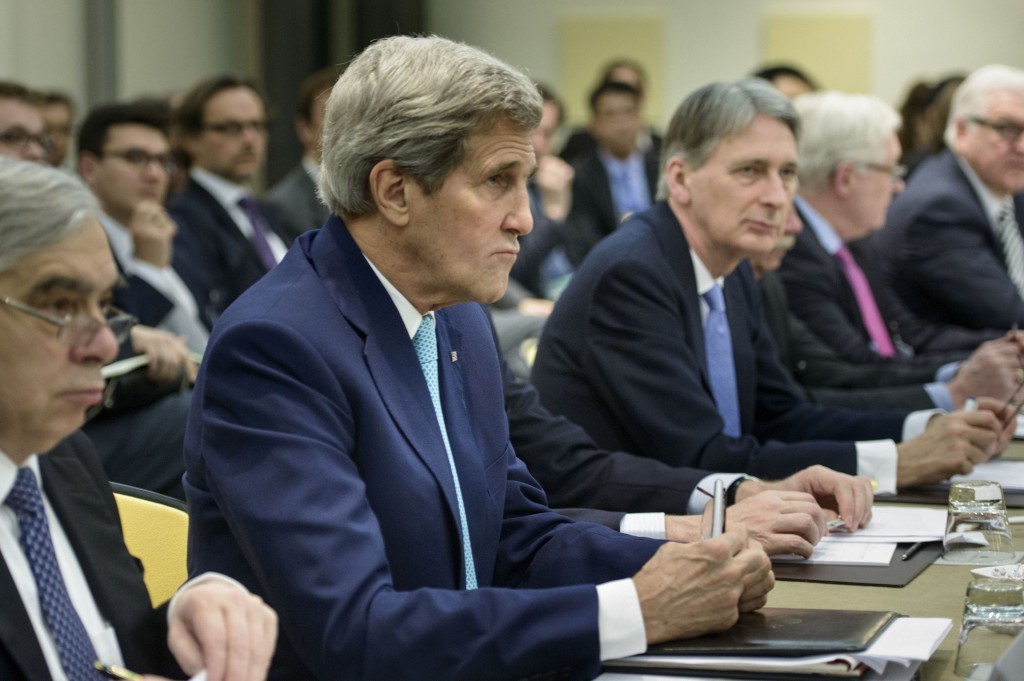
Iran and world powers are weighing compromises in order to overcome a deadlock in nuclear talks with little more than 12 hours to reach an agreement.
“We’re in a bit of a crisis with the talks; perhaps we have a bit of a new approach, we will see,” Frank-Walter Steinmeier told reporters on Tuesday. Russia’s Foreign Minister Sergei Lavrov said in Moscow that there’s still a good chance the sides can overcome their differences before the deadline.
An understanding can be reached “as long as none of the participants at the talks raise their stakes at the last moment,” Lavrov said at a press conference prior to returning to Lausanne, Switzerland, where the negotiations are taking place.
The effort to end a 12-year standoff has negotiators still divided over the pace of easing sanctions on Iran, and the limits to be imposed on its research to ensure it can’t obtain nuclear weapons.
A framework accord by the end of Tuesday would be a first step toward ending Iran’s economic isolation and allowing the country with the world’s fourth-biggest oil reserves to export freely. An additional three months are envisaged for reaching a detailed final agreement.
Talks are stuck on how to roll back the sanctions that have slashed Iran’s oil output, and how to re-impose them should Iran violate the agreement, a European diplomat who spoke on condition of not being identified said on Monday. Both sides are playing a high-stakes game of chicken and the situation was changing hour-by-hour, the negotiator said.
“There are different formulas, either to lift them or first to suspend them and then lift them in a legal sense,” Lavrov said of the dispute over easing sanctions. In the event of a deal, “the sanctions should no longer be in effect and shouldn’t prevent the development of legitimate economic and trade interests.”
Iranian Supreme Leader Ayatollah Ali Khamenei has demanded the immediate end of sanctions. Western powers have proposed lifting United Nations sanctions over four to six years, while other curbs may remain in place for as long as a decade, according to two people involved in the talks.
“Tricky issues” remain to be resolved, U.S. Secretary of State John Kerry told CNN Monday evening during a break in talks.
If no deal is reached on Tuesday, “we have to look at the path forward,” U.S. State Department spokeswoman Marie Harf said Monday. She said no decision has been made on how to dispose of much of Iran’s enriched uranium, a key element in ensuring that the nuclear program is peaceful.
The six powers negotiating with Iran prefer that the uranium, which is used to fabricate fuel for power plants and a medical reactor, be transferred to a guarantor nation, though other options are being discussed, the European diplomat said.
China’s Foreign Minister Wang Yi sounded an optimistic note yesterday, saying that “the scale of disagreement has shrunk” as diplomats enter what he likened to the final sprint of their marathon.
A failure of the talks would be a blow to President Barack Obama, who has backed two years of negotiations with Iran despite domestic opposition. Republicans and many Democrats in Congress say they agree with Israeli Prime Minister Benjamin Netanyahu’s argument that the emerging accord is dangerous.
“In Lausanne, they are closing their eyes,” Netanyahu’s office said Monday. “But we are not closing our eyes and we will continue to act against every threat.”
In Iran, hardliners issued a last-ditch warning to Foreign Minister Mohammad Javad Zarif, telling him not to make concessions that cross the Islamic Republic’s red lines.
It’s unacceptable for a deal to keep UN sanctions in place, or require Iran to make irrevocable commitments while the other side’s steps could be reversed, said Hossein Shariatmadari, editor-in-chief of the conservative Kayhan newspaper.